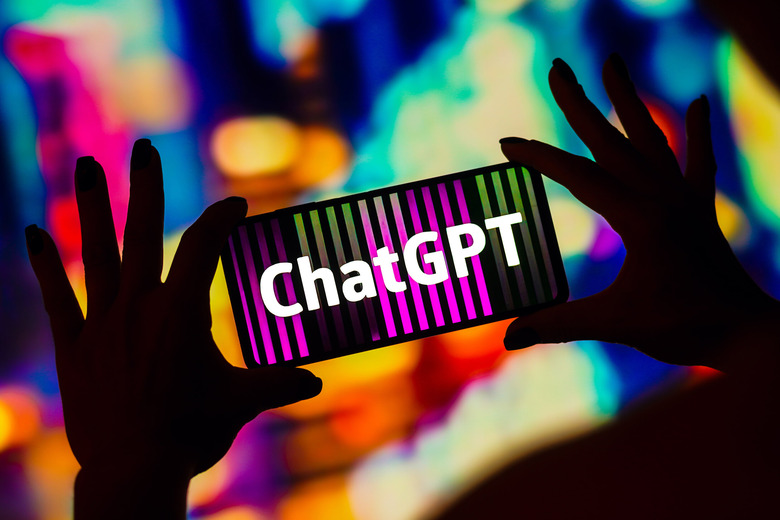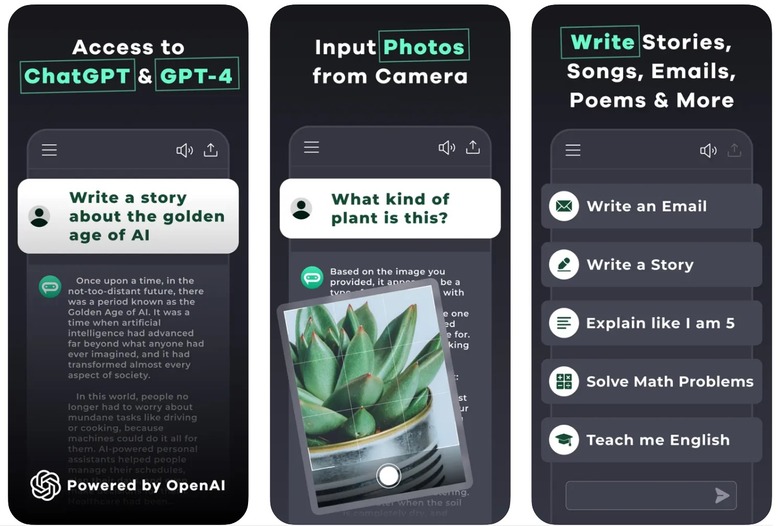Delete These Fake ChatGPT Apps From Your Smartphone Right Now
ChatGPT continues to be a tech sensation. The basic generative AI is available for free to anyone looking to use it. But plenty of people are looking to take advantage of ChatGPT's popularity and profit from it. We've already seen the rampant malware attacks based on ChatGPT, but that's not the only malicious behavior you should know. Fake ChatGPT apps continue to be available on iPhone and Android, demanding paid subscriptions for access to ChatGPT.
Security firm Sophos detailed some of the so-called "FleeceGPT" mobile apps that might be available in the App Store and Google Play. They're fleeceware apps that you should consider getting rid of right now.
What is fleeceware?
Sophos says in a blog post that it saw a spike in fleeceware mobile apps claiming connections to ChatGPT. These apps have the following behavior, as detailed by Sophos:
- Their functionality is available for free through either the mobile OS itself or other sources online.
- They push the user toward enrolling in a short free trial that converts to a high recurring subscription charge to rake in money from unsuspecting users.
- They use intrusive advertising and other features to make the free version barely usable and to push the user toward the subscription.
Essentially, the apps are a portal through which you can access ChatGPT, and we've seen genuine ChatGPT apps for iPhone that offer such functionality for free or with a subscription. But fleeceware apps provide limited access to ChatGPT, and they require the user purchases a subscription to enable the full functionality of the apps.
As the company explains, the apps will limit ChatGPT's functionality or bombard the user with ads to convince them to upgrade to a paid subscription.
Sophos says it has identified several apps with this behavior, pointing them out to Google and Apple. Google reportedly removed some of the apps, while Apple acknowledged Sophos' information without taking action.
It's important to remember that fleeceware apps don't break any rules. That they're unethical, but that's a different issue. The apps must obey the general App Store and Google Play rules that Apple and Google have in place to have their app listed in these stores.
Fake ChatGPT apps for iPhone and Android
The company identified several fake ChatGPT iPhone and Android apps that are trying to make money from the basic functionality of OpenAI's generative AI.
You might still have some of them installed on your device. And you can keep using them if you like any of them. You can also pay for a subscription if you think it adds value to your ChatGPT experience. But you might be better off getting ChatGPT Plus from OpenAI for $20 a month and avoiding these fake iPhone and Android apps.
Sophos identified the following fake ChatGPT apps that you'd be best staying away from. These apps might be available on Android, iPhone, or both:
- Chat GBT
- GAl Assistant
- Al Chat GBT – Open Chatbot App
- Al Chat – Chatbot Al Assistant
- Genie AI Chatbot
- Al Chatbot – Open Chat Writer
Out of all these apps, Genie AI Chatbot works almost as advertised. The security company explains:
Unlike some of the others, Genie actually works at something approaching full advertised functionality without the trial or subscription—but only accepts 4 queries per day. It then prompts users with the trial offer again.
But the app is limited without a subscription of $7 a week or $70 a year. We've previously included Genie in lists of ChatGPT apps for iPhone. It appears the app isn't fully what we thought, and it further proves a point I made before. You should always double-check that ChatGPT apps and extensions come from reputable sources.
Per Sophos data, which comes from Sensor Tower, Genie might have made $700,000 just last month from the iPhone app. Comparatively, GAI Assistant raked in about $5,000 (Android) and $10,000 (iPhone) in March.
How to stop paying for fake ChatGPT apps
Even if Google and Apple delete all the fake ChatGPT apps, they'll still work on your devices if you have them installed. And they'll still rake in money if you paid for premium access.
Thankfully, it's easy to unsubscribe, and you should do it as fast as possible.
Here's how to stop paying for a ChatGPT subscription on iPhone:
- Open the Settings app.
- Tap your name.
- Tap Subscriptions.
- Tap the subscription.
- Tap Cancel Subscription. You might need to scroll down to find the Cancel Subscription button. If there is no Cancel button or you see an expiration message in red text, the subscription is already canceled.
The instructions come from Apple's support pages and apply to any app subscription, not just ChatGPT apps.
Here are Google's instructions for removing app subscriptions on Android devices:
- Go to your subscriptions in the Google Play app.
- Select the subscription you want to cancel.
- Tap Cancel subscription.
- Follow the instructions
You should also read Sophos' full report on fake ChatGPT apps at this link, as it explains in detail the behavior of these fleeceware apps.


